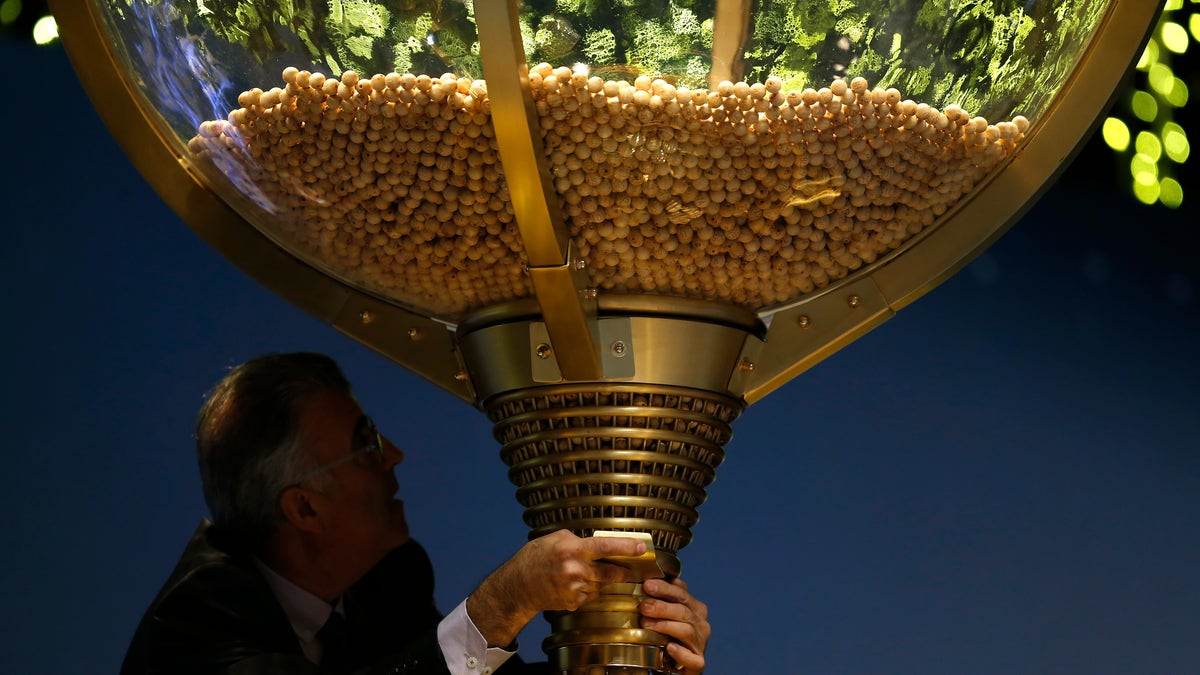
A worker opens a trap-door in a giant drum to let the balls bearing ticket numbers fall before the start of Spain's Christmas lottery. (AP Photo/Francisco Seco)
MADRID – Decked out in their school uniforms, young Spanish school children in Madrid's stately Teatro Real opera house sang out lottery numbers on live TV Tuesday for Spain's massively popular Christmas lottery that showered 2.2 billion euros ($2.4 billion) across the country.
They finally sang out "El Gordo," the biggest winner in the drawing: number 79,140. People who bought that number in a southern beach city were the luckiest ones this year.
But Spaniards all over the nation shared in the wealth because their lottery system doles out prizes much more broadly than lotteries with huge jackpots for just a few winners.
The No. 1 prize gives out a jackpot of just 400,000 euros, but more than 1,000 tickets win the big one and the lottery hands out 24 million prizes overall.
Though other lotteries make headlines with their larger top prizes, El Gordo (The Fat One) is ranked as the world's richest and makes its mark every year in Spain, uniting the country because almost everyone takes part.
With so many prizes, there are plenty of winnings for Spaniards who band together in office pools and groups of family members or friends to buy anywhere from one to dozens of the tickets costing 20 euros each.
People can't pick their own numbers, so if they want a certain one they have to go online to find out if it exists and if so which agency or agencies are selling it.
Across the nation, people stay glued to the television as lower level winning numbers are announced until El Gordo is sung out. Then a tradition kicks in, with people who purchased winning tickets on their own or in groups showing up outside the lottery agency that sold them the tickets for gleeful fiestas.
The lottery has always been immensely popular but has taken on special importance in recent years as Spain struggled through a real estate bubble and the European debt crisis. While lottery winners used to buy apartments or new cars during Spain's boom years, many winners hurt by the economic crisis now use winnings to pay off debt.
The top winning number is usually sold in a number of different agencies, but went this time to just one in the southern beach town of Roquetas de Mar, where elated winners arrived and cracked open bottles of sparkling wine for a celebratory street party.
The mayor called the win great news for his city in the province of Almeria, which relies on tourism and agriculture but has an unemployment rate of 31 percent -- much higher than Spain's national 21 percent jobless rate.
"I'm really happy and I congratulate all the winners," Mayor Gabriel Amat told the Voz de Almeria newspaper. "It's very important for the town, especially in the difficult times we've been facing."
Similar scenes happened at lottery agencies around the country that sold tickets with lower payouts, with scenes of the street parties broadcast live on television.
The lottery was first established as a charity in 1763, during the reign of King Carlos III, but its objective gradually shifted toward filling state coffers. El Gordo itself dates from 1812 and the children who have sung out the numbers for centuries attend the Saint Ildefonso school.
School children also featured hugely this year for the top winning ticket -- with nearly half bought from the Roquetas de Mar lottery agency by a high school in the nearby town of Laujar de Andarax, population of 1,600. Students then resold the tickets to raise money for a school trip, meaning the town was flush with winners.
"Nearly everyone has a ticket, or a share in one," Laujar de Andarax mayor Almudena Morales told Spain's Europa Press news agency. "They went to workers who need it a lot. And to top it off, they were distributed by the kids."
The lottery agency manager didn't buy any of his own tickets this year but told Spanish National Television he was happy so many people bought winners from him.
"I feel a great joy, mainly because it's so well spread out, especially among workers," Jose Martin said.
